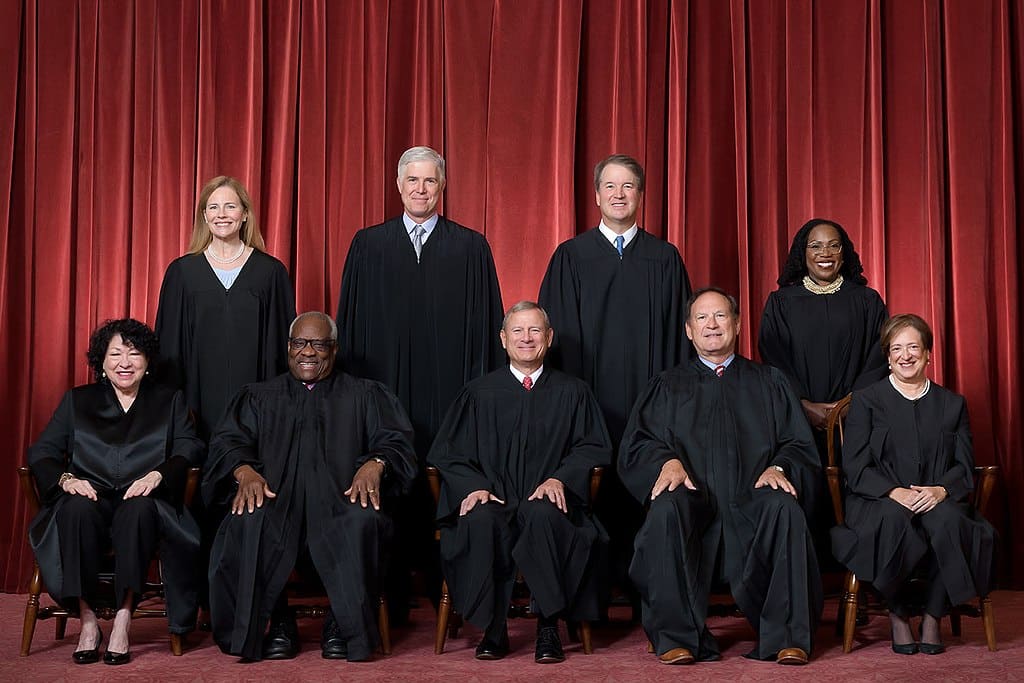The Supreme Court said Monday it was adopting its first-ever code of conduct for ethics, amid pressure from Congress and criticism over undisclosed trips and gifts from wealthy benefactors to some of the Justices.
Adoption of the policy, which was issued on Monday and signed by all nine Justices, would end the Supreme Court’s practice of being virtually the only court in the U.S. to not have to abide by a formal code of ethics.
Among the guidelines outlined in the 14-page policy:
• A Justice should uphold the integrity and independence of the judiciary by observing “high standards of conduct.”
• A Justice should avoid impropriety and the appearance of impropriety in all activities by having respect for the law, and to “not allow family, social, political, financial, or other relationships to influence official conduct or judgment.” And Justices should adhere to “Nondiscrminatory Membership”—meaning a Justice should “not hold membership in any organization that practices invidious discrimination on the basis of race, sex, religion, or national origin.”
• A Justice should perform the duties of office fairly, impartially, and diligently. Among their “responsibilities,” the Justices should “not be swayed by partisan interests, public clamor, or fear of criticism.”
Further, a Justice “should disqualify himself or herself in a proceeding in which the Justice’s impartiality might reasonably be questioned, that is, where an unbiased and reasonable person who is aware of all relevant circumstances would doubt that the Justice could fairly discharge his or her duties.” This includes if the Justice has a “personal bias or prejudice concerning a party, or personal knowledge of disputed evidentiary facts concerning the proceeding.”
• A Justice may engage in extrajudicial activities that are consistent with the obligations of the judicial office. This includes speaking, writing and teaching or participating in other activities concerning the law—except at events that are “sponsored by or associated with a political party or a campaign for political office,” or that promote a “commercial product or service” with the exception of an event where a Justice’s books are available for purchase.
Further, Justices should not speak or participate in meetings or groups he or she knows have a substantial financial interests in the outcome of a case. Justices may attend “fundraising event[s]” of law-related or non-profit organizations, however.
The guidelines also lay out rules for fundraising; financial activities; fiduciary activities; governmental appointments; chambers, resources, and staff; compensation, reimbursement, and financial reporting.
A Justice should also refrain from political activity.
The policy dictates that the Office of Legal Counsel will “maintain specific guidance tailored to recurring ethics and financial disclosure issues and will continue to provide annual training on those issues to Justices, chambers staff, and other Court personnel,” though it doesn’t specifically say what would happen if a Justice should violate the guidelines, and it mentions no mechanism for enforcement.
The new policy comes as the Senate postponed a plan last week to subpoena several political donors on their funding luxury travel for Supreme Court Justices Clarence Thomas and Samuel Alito.
The Senate Judiciary Committee’s intensified scrutiny of the Court came after months of reporting by ProPublica and other news outlets about not only conservative but also liberal Justices’ ethics and behavior.
Committee Chair Dick Durbin (D-IL) had repeatedly warned Chief Justice John Roberts to end the Supreme Court’s practice of being virtually the only court in the U.S. operating without a formal code of ethics, or Congress would create a code for it.
The Supreme Court began its latest term earlier last month under record disapproval ratings. According to a polling average in October from ABC News’ polling tracker 538, only 38% of Americans approve of the job the Supreme Court is doing while 54% disapprove.
Read more exclusive news from Political IQ.


